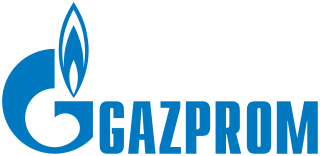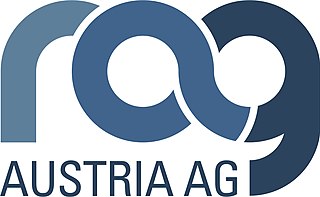
PJSC Gazprom is a Russian majority state-owned multinational energy corporation headquartered in the Lakhta Center in Saint Petersburg. The Gazprom name is a contraction of the Russian words gazovaya promyshlennost. In January 2022, Gazprom displaced Sberbank from the first place in the list of the largest company in Russia by market capitalization. In 2022, the company's revenue amounted to 8 trillion rubles.
Nord Stream is a pair of offshore natural gas pipelines in Europe that run under the Baltic Sea from Russia to Germany. It consists of the Nord Stream 1 (NS1) pipeline running from Vyborg in northwestern Russia, near Finland, and the Nord Stream 2 (NS2) pipeline running from Ust-Luga in northwestern Russia near Estonia. Both pipelines run to Lubmin in the northeastern German state of Mecklenburg-Vorpommern. Each pipeline contains two pipes, denoted A and B; each of the four pipes is approximately 1,200 kilometres (750 mi) long and with approximate diameters of 1,220 millimetres (48 in). The combined capacity of the four pipes is 110 billion cubic metres per annum of natural gas.
Rehden–Hamburg gas pipeline (RHG) is a 132 kilometres (82 mi) long branch of MIDAL pipeline with diameter of 800 millimetres (31 in) to supply Hamburg area with natural gas. The pipeline was constructed in 1994 by Wingas and E.ON Hanse. It connects to the natural gas storage facility in Rehden.

Wintershall Holding GmbH, based in Kassel, was Germany's largest crude oil and natural gas producer. It was a wholly owned subsidiary of BASF. The company was active in oil and gas exploration and production with operations in Europe, North Africa, South America as well as Russia and the Middle East region. Wintershall employed more than 2,000 people worldwide. In the 2018 financial year the company produced around 171 million barrels of oil equivalent (boe) of oil and gas. Revenues amounted to 4.09 billion euros.

The NEL (Nordeuropäische Erdgasleitung, formerly known as Norddeutsche Erdgasleitung, is a 440 kilometres long natural gas pipeline in Germany.

Russia's energy policy is presented in the government's Energy Strategy document, first approved in 2000, which sets out the government's policy to 2020. The Energy Strategy outlines several key priorities: increased energy efficiency, reducing the impact on the environment, sustainable development, energy development and technological development, as well as improved effectiveness and competitiveness. Russia's greenhouse gas emissions are large because of its energy policy. Russia is rich in natural energy resources and is one of the world's energy superpowers. Russia is the world's leading net energy exporter, and was a major supplier to the European Union until the Russian invasion of Ukraine. Russia has signed and ratified the Kyoto Protocol and Paris Agreement. Numerous scholars posit that Russia uses its energy exports as a foreign policy instrument towards other countries.

South Stream is a canceled pipeline project to transport natural gas of the Russian Federation through the Black Sea to Bulgaria and through Serbia, Hungary and Slovenia further to Austria. It was never finished.

SEFE Energy is a gas distribution company located in Kassel, Germany. It is a subsidiary of Securing Energy for Europe.

RAG Austria AG (RAG) is the largest gas storage operator and thus energy storage company in Austria. The company focuses its business activities on the storage of natural gas and other gaseous energy and the development of green-gas technologies. With a total storage capacity of more than six billion cubic meters of natural gas, RAG contributes to the security of supply of Austria and Central Europe. RAG operates the Haidach gas storage facility in joint ventures with Gazprom Export and Wingas as well as the 7Fields gas storage facility together with Uniper. In addition RAG operates its own storage facilities at Puchkirchen/Haag, Haidach 5, Aigelsbrunn, 7Fields(RAG). The production and use of gas as fuel are also business areas of RAG.

Haidach gas storage is an underground natural gas storage in the town of Haidach near Salzburg, Austria. As of the end of 2018 with a capacity of ~2.9 billion cubic meters (bcm) it is the third largest gas storage facility in Central Europe.
Centrex Europe Energy and Gas AG is "an international group of companies operating in the natural gas sector, focussing on the extraction and marketing of natural gas reserves". It is believed to be a Gazprom front company.
Vemex is a Gazprom-controlled natural gas trading company in the Czech Republic. In addition to the Czech Republic, the company also operates in Slovakia.

Russia supplies a significant volume of fossil fuels to other European countries. In 2021, it was the largest exporter of oil and natural gas to the European Union, (90%) and 40% of gas consumed in the EU came from Russia.

Uniper SE is a German multinational energy company based in Düsseldorf, Germany, which has been a state-owned enterprise since late 2022. It is one of the biggest energy companies by revenue in Europe. The name of the company is a portmanteau of "unique" and "performance", which was given by long-term employee Gregor Recke. Uniper was formed by the separation of E.ON's fossil fuel assets into a separate company that began operating on 1 January 2016. In 2019, the company employed about 6,800 people in over 40 countries. In 2018, around one-third of the employees were based in Germany. Until 2022, it owned a subsidiary company in Russia called Unipro. Uniper was listed on the Frankfurt Stock Exchange.
Nord Stream 2 is a 1,234-kilometre-long (767 mi) natural gas pipeline from Russia to Germany running through the Baltic Sea, financed by Gazprom and several European energy companies. Feasibility studies began in 2011 to expand the Nord Stream 1 line and double annual capacity to 110 billion cubic metres, with construction beginning in 2018. It was completed in September 2021, but has not yet entered service. Planning and construction of the pipeline were mired in political controversy over fears that Russia would use it, one of 23 pipelines between Europe and Russia, for geopolitical advantage with Europe and Ukraine.

Wintershall Dea GmbH is a German gas and oil producer. The joint venture was created in May 2019 by the merger between Wintershall Holding GmbH and DEA Deutsche Erdoel AG. BASF SE has a 67% stake in it, with the other 33% being held by LetterOne, whose main ultimate owner is the Russian business magnate Mikhail Fridman. As of 2020 it was planning listing on the Frankfurt Stock Exchange.

The Russia–EU gas dispute flared up in March 2022 following the invasion of Ukraine on 24 February 2022. Russia and the major EU countries clashed over the issue of payment for natural gas pipelined to Europe by Russia's Gazprom, amidst sanctions on Russia that were expanded in response to Russia's 2022 invasion of Ukraine. In June, Gazprom claimed it was obliged to cut the flow of gas to Germany by more than half, as a result of such sanctions that prevented the Russian company from receiving its turbine component from Canada. On 26 September 2022, three of the four pipes of the Nord Stream 1 and 2 gas pipelines were sabotaged. This resulted in a record release of 115,000 tonnes of methane (CH4) – an equivalent of 15 million tonnes of carbon dioxide (CO2) – and is believed to have made a contribution to global warming.
Starting in late 2022, Moldova suffered an energy crisis, the worst since its independence. It was provoked by the reduction of gas supplies to Moldova by Russia's Gazprom. The energy crisis took place in the context of the Russian invasion of Ukraine.

The first plant, Sakhalin II, was completed in Russia in 2009 having utilised the skills of Shell plc, who under duress sold 50% of the project to Gazprom in 2006. Prior to 2017 Gazprom was the sole producer of Liquefied Natural Gas (LNG) in Russia.













